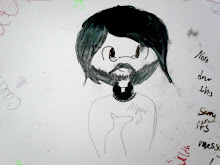With the weather more-or-less cold and staying that way, the heady days of mate at La Rambla have run their course, and in their wake come the books and the fragments of thoughts left aside to age in the summer, new distractions for those times when I´m not at La Obra, the church office, or with friends.
In my books, I´ve visited some old friends and made some new ones, in English and in Spanish. In the past month, I´ve re-read The Scarlet Letter, and felt it resonate deep inside me, feeling it in a way I never could as a high school junior. I´ve read La Casa de los Espíritus (The House of the Spirits) en español, and after seeing La Moneda in Santiago, I could imagine the surreal horror of the climax - the spectacled president, besieged in his own home, watching his own country´s army open fire on him. I´ve read some Borges and had my brain twisted about in every which-way possible; libraries, lotteries, imaginary books, and gardens that somehow are all universes in and of themselves...and each less than 20 pages of dense intricacy. A slow day at La Obra, I pulled out a copy of Horacio Quiroga´s (the Uruguayan Edgar Allen Poe, more or less) Cuentos de Amor, de Locura y de Muerte and read two stories I read in Spanish III in high school, El Almohadón de Plumas (the feather pillow) and La Gallina Degollada (the beheaded chicken). A little part of me jumped inside when I remembered the admittedly-gory ends of the stories halfway through each one.
I´ve been thinking about the idea of the Hegelian dialectic a lot in all of this reading - thesis, antithesis, synthesis, the never-ending spiral in which we encounter a text, come away from it changed, and later come back to it and find it to be different because of how we´ve changed. Take The Scarlet Letter. When I read it as a 16 year old, it made me think about how we all have our own scarlet letter, be it internal or external, and its somehow this sense of mutual sinfulness that ought to unite us, one people broken and in no position to judge the other. I went some years with this thought in my head, and then came back to the novel...and it wasn´t the same. This time, it told me about grace beyond our human comprehension, grace so foreign to us that accepting it is nearly impossible - we become Dimmesdales who´d rather torture ourselves and sorrow in our inadequacies, or else Chillingworths who, incapable of receiving grace, become equal incapable of extending it to others. Hester Prynne´s quiet strength and frankness about her inability to understand the strange, wild Pearl which she was given somehow speaks volumes about how to live...we are broken, but we don´t have to stay that way, even if we don´t understand the means that allow us to be mended into something not whole, but reconstructed.
I think, too, about the different experiences I had with The House of the Spirits, having read it a few years ago in English. In English, it was a haunting and compelling novel, at turns foggy and summer clear...but I didn´t connect to it on an emotional level. In Spanish, during and after a trip to Chile, it was one of the most profoundly moving works of literature I´ve read...I think the image of me, sitting on my rooftop at sunset, reading the description of the 1973 coup and fighting tears (of sorrow, of anger, of shame) is one that will stay with me for a very long time. Context makes a difference, language makes a difference.
I wonder how I´ll find Borges in a few years, or maybe longer, when I make my way back to the stories in El Jardín de los Senderos que Bifurcan (The Garden of the Forking Paths): the death of a pagan priest who painlessly burns to death in a fire and realizes, as he´s dying, that he´s just a dream in the mind of someone else, just like the young man he himself created in a dream; the Babylonian lottery in which everything is a result of a game of chance, even down to errors in public documents; the garden which is a novel in which all possible events happen simultaneously, creating a universe in which multiple timelines exist and meander through each other like a cosmic plate of spaghetti.
I even wonder how I´ll feel at the end of Anna Karenina, which I´m reading now, seeing how much has changed since my senior year in high school when I read it in 5 days over Christmas break. Books, to me, exist on a level on slightly below sentient beings - they have personalities, they have individuality, and, just like us, they never change in that they´re constantly changing...the same essence, the same words and pages (just as we´re the same cells and organs and bones), but never failing to grow right along with us, if we care enough to pay attention.
Or maybe I just read too much.
Friday, May 2, 2008
Subscribe to:
Post Comments (Atom)

No comments:
Post a Comment